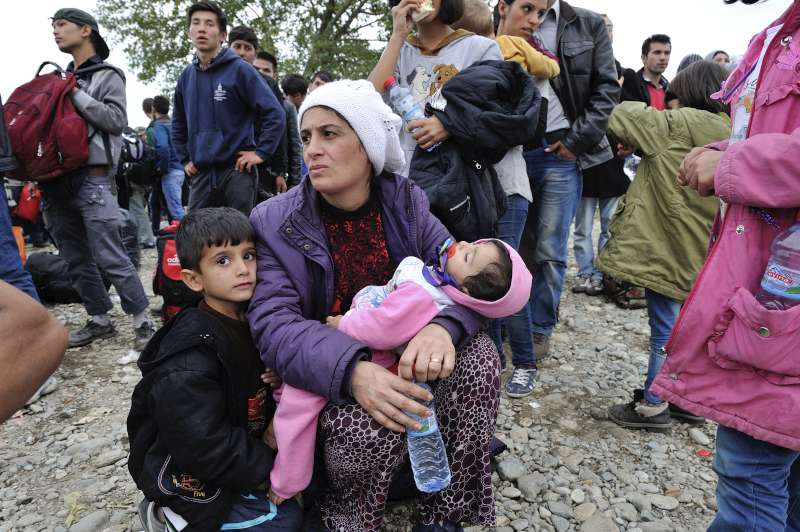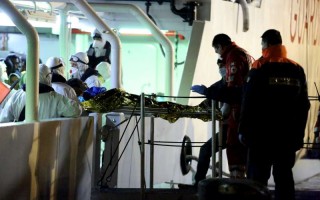
Mother and children waiting with other refugees to enter Vinojug reception centre at Gevgelija. © UNHCR / M. Henley
GENEVA, Oct 20 (UNHCR)—Sea arrivals so far this year to Greece have now passed the half-million mark with the arrival yesterday on the Aegean Islands of nearly 8,000 people, the UN refugee agency said today.
It added that the latest arrivals had taken the overall total to some 502,500 for this year and said that the spike in arrivals in Greece was sharply increasing reception pressures on the islands. Many of the refugees and migrants are desperate to move quickly onward to Western Europe, fearing that borders ahead of them will close.
“It is of utmost importance here, as in other parts of Europe, that reception conditions be adequate to the task. Without this essential element, the relocation program agreed by Europe in September is in serious peril and may fail,” UNHCR spokesperson Melissa Fleming told a press briefing in Geneva.
The total number of refugees and migrants to reach Europe so far this year via the Mediterranean is now over 643,000, UNHCR figures show. As of Tuesday morning, there were more than 27,500 people on the Aegean Islands, either awaiting registration or onward transport to the mainland.
Additional police had to be called in on Sunday and Monday (October 18 and 19) to provide security on the Islands, where frustration among refugees and migrants boiled over at a reception centre on Lesvos last week, leading to the evacuation of UNHCR staff and the temporary suspension of processing.
Borders along the Balkan routes have recently reopened. On the Serbian border with Croatia, some 3,000 people were left waiting in the rain in the past two days without shelter and with minimal assistance on hand.
“UNHCR staff and staff of our partner organizations provided what support they could at such short notice including food, water, and blankets. But many people, including the elderly, pregnant women and several physically handicapped people, were soaked through and instances of hypothermia were reported,” Fleming added, noting that similar scenes were reported on the Croatia-Slovenia border.
While conditions at some crossing points in the Balkans remain difficult, movement has resumed, with 4,300 people arriving in Austria from Slovenia on Monday. Meanwhile, in Austria and Germany, tens of thousands of refugees and migrants are sleeping in tents and temporary shelters because of accommodation shortages.
At least 19 people have died crossing the Aegean to Greece from Turkey in the past nine days in five separate incidents, almost half of them over the weekend, UNHCR said. Infants and children were among those who have perished
Refugees that UNHCR officials spoke to over the weekend reported that smugglers were offering discounts rates for crossings in bad weather and packing more people onto boats for the crossing, which frequently proves fatal.
At least 123 people have died or gone missing in Greek territorial waters so far this year. In total, at least 3,135 have perished in the Mediterranean to date in 2015.
“We are concerned at the potential for this number to rise further as people try to beat the onset of winter and fears of new border-closures. UNHCR urges that search and rescue operations be further strengthened in this area to reduce risks,” Fleming said.
To address the current situation in Europe, UNHCR says various stabilization measures are needed. These include strong support to countries hosting the vast majority of Syrian, Iraqi and Afghan refugees, an information campaign informing of the dangers of the sea journey, and the development of legal pathways to seek protection in Europe.
“In countries of secondary movement in Europe, significant efforts must be made to develop a robust reception and registration capacity in order for the relocation program to work,” Fleming added.





